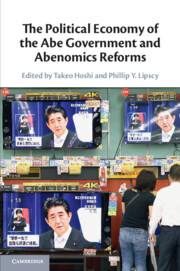The Political Economy of the Abe Government and Abenomics Reforms
Coordonnateurs : Hoshi Takeo, Lipscy Phillip Y.

Phillip Y. Lipscy is Associate Professor of Political Science and Director of the Centre for the Study of Global Japan at the Munk School of Global Affairs and Public Policy, University of Toronto. He researches international and comparative political economy with a focus on Japan. He is author of Renegotiating the World Order: Institutional Change in International Relations (2017) and co-editor of Japan under the DPJ: The Politics of Transition and Governance (2013). Lipscy obtained his PhD in political science at Harvard University, an MA in international policy studies and BA in economics and political science at Stanford University.
Date de parution : 05-2022
Ouvrage de 572 p.
15.2x22.9 cm
Disponible chez l'éditeur (délai d'approvisionnement : 14 jours).
Prix indicatif 39,35 €
Ajouter au panierDate de parution : 02-2021
Ouvrage de 500 p.
15.6x23.5 cm
Disponible chez l'éditeur (délai d'approvisionnement : 14 jours).
Prix indicatif 148,73 €
Ajouter au panier


